| Listing 1 - 8 of 8 |
Sort by
|
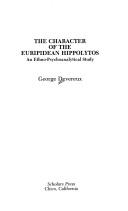
ISBN: 0891307893 Year: 1985 Publisher: Chico Scholars press
Abstract | Keywords | Export | Availability | Bookmark
 Loading...
Loading...Choose an application
- Reference Manager
- EndNote
- RefWorks (Direct export to RefWorks)
Hippolytus (Greek mythology) in literature --- Sex in literature --- Tragedy --- Psychoanalysis and literature --- -Literature and psychoanalysis --- Psychoanalytic literary criticism --- Literature --- Drama --- Euripides --- -Euripides --- Euripide --- -Drama --- Literature and psychoanalysis --- Euripides.
Book
ISBN: 1282904256 9786612904257 0822381796 Year: 1993 Publisher: Durham, N.C. : Duke University Press,
Abstract | Keywords | Export | Availability | Bookmark
 Loading...
Loading...Choose an application
- Reference Manager
- EndNote
- RefWorks (Direct export to RefWorks)
Where is the pleasure in tragedy? This question, how suffering and sorrow become the stuff of aesthetic delight, is at the center of Charles Segal's new book, which collects and expands his recent explorations of Euripides' art. Alcestis, Hippolytus, and Hecuba, the three early plays interpreted here, are linked by common themes of violence, death, lamentation and mourning, and by their implicit definitions of male and female roles. Segal shows how these plays draw on ancient traditions of poetic and ritual commemoration, particularly epic song, and at the same time refashion these traditions
Hippolytus (Greek mythology) in literature. --- Hecuba (Legendary character) in literature. --- Alcestis (Greek mythology) in literature. --- Trojan War --- Sex role in literature. --- Grief in literature. --- Tragedy. --- Literature and the war. --- Euripides --- Euripides. --- Criticism and interpretation.
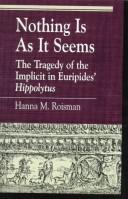
ISBN: 0847690938 084769092X Year: 1999 Volume: *6 Publisher: Totowa Rowman & Littlefield
Abstract | Keywords | Export | Availability | Bookmark
 Loading...
Loading...Choose an application
- Reference Manager
- EndNote
- RefWorks (Direct export to RefWorks)
Hippolyte (Mythologie grecque) dans la littérature --- Hippolytus (Greek mythology) in literature --- Hippolytus (Griekse mythologie) in de literatuur --- Phaedra (Greek mythology) in literature --- Phaedra (Griekse mythologie) in de literatuur --- Phèdre (Mythologie grecque) dans la littérature --- Tragedie --- Tragedy --- Tragédie --- Treurspel --- Greek drama (Tragedy) --- Hippolytus (Greek mythology) in literature. --- Phaedra (Greek mythology) in literature. --- Tragédie grecque --- History and criticism --- Histoire et critique --- Euripides. --- Tragedy. --- Tragédie grecque --- Hippolyte (Mythologie grecque) dans la littérature --- Phèdre (Mythologie grecque) dans la littérature --- Drama --- Euripides
Book
ISBN: 0801835305 Year: 1987 Publisher: Baltimore (Md.) : Johns Hopkins university press,
Abstract | Keywords | Export | Availability | Bookmark
 Loading...
Loading...Choose an application
- Reference Manager
- EndNote
- RefWorks (Direct export to RefWorks)
875 EURIPIDES --- Hecuba (Legendary character) in literature --- Heroes in literature --- Hippolytus (Greek mythology) in literature --- Queens in literature --- Tragedy --- Trojan War --- -Mythology, Greek --- Drama --- Griekse literatuur--EURIPIDES --- Literature and the war --- Euripides --- Troy (Extinct city) --- -In literature --- Hecuba (Legendary character) in literature. --- Heroes in literature. --- Hippolytus (Greek mythology) in literature. --- Queens in literature. --- Tragedy. --- Literature and the war. --- -Griekse literatuur--EURIPIDES --- 875 EURIPIDES Griekse literatuur--EURIPIDES --- Euripide --- -Drama --- Mythology, Greek --- -875 EURIPIDES Griekse literatuur--EURIPIDES --- Euripides. --- In literature.
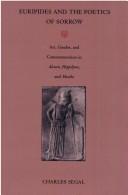
ISBN: 9780822313601 082231360X Year: 1993 Publisher: Durham Duke university press
Abstract | Keywords | Export | Availability | Bookmark
 Loading...
Loading...Choose an application
- Reference Manager
- EndNote
- RefWorks (Direct export to RefWorks)
Hippolytus (Greek mythology) in literature. --- Hecuba (Legendary character) in literature. --- Alcestis (Greek mythology) in literature. --- Trojan War --- Sex role in literature. --- Grief in literature. --- Tragedy. --- Literature and the war. --- Euripides --- Criticism and interpretation. --- Alcestis (Greek mythology) in literature --- Grief in literature --- Hecuba (Legendary character) in literature --- Hippolytus (Greek mythology) in literature --- Sex role in literature --- Tragedy --- Drama --- Literature and the war --- Euripide (0480-0406-av.-J.-C.) --- Chagrin --- Rôle selon le sexe --- Critique et interprétation --- Dans la littérature --- Rôle selon le sexe --- Critique et interprétation --- Dans la littérature
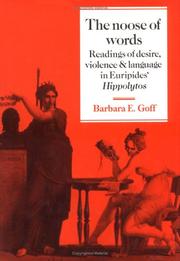
ISBN: 0521363977 0521033233 0511627319 Year: 1990 Publisher: Cambridge : Cambridge University Press,
Abstract | Keywords | Export | Availability | Bookmark
 Loading...
Loading...Choose an application
- Reference Manager
- EndNote
- RefWorks (Direct export to RefWorks)
This 1990 book is a reading of Euripides' Hippolytos, a central play for the study of Euripides and of Greek tragedy. Dr Goff approaches the play through the techniques of modern literary criticism, including deconstruction and feminism, and is able to shed light on this influential text through her close examination of the language of the play. She divides her discussion into five important critical issues: gender, desire, violence, language and the status of poetry and drama. Throughout she is concerned to site the play in the historical and cultural context of fifth-century Athens, and her analysis of the position of women is particularly illuminating for the role of Phaedra, and for female characters throughout Greek tragedy. This is a provocative book which brings critical insights to one of the most extensively discussed of all Greek tragedies. It will be accessible both to classicists and students of drama and literary theory.
Euripides. --- Desire in literature. --- Hippolytus (Greek mythology) in literature. --- Phaedra (Greek mythology) in literature. --- Tragedy. --- Violence in literature. --- Arts and Humanities --- History --- Hippolytus --- In literature. --- Drama --- Hipòlit --- Hipolitas --- Hipólito --- Hippolütosz --- Hippolyte --- Hippolytos --- Ippolito --- Ippolitu --- 威耳比俄斯 --- Іпполіт --- Хиполит --- Ипполит --- ヒッポリュトス --- هيبوليتوس --- Ἱππόλυτος
Book
ISBN: 0820411825 Year: 1990 Publisher: New York (N.Y.): Lang
Abstract | Keywords | Export | Availability | Bookmark
 Loading...
Loading...Choose an application
- Reference Manager
- EndNote
- RefWorks (Direct export to RefWorks)
Comparative literature --- Hippolytus (Greek mythology) in literature --- Phaedra (Greek mythology) in literature --- Space and time in literature --- Theater --- Tragedy --- Drama --- Space and time as a theme in literature --- Literature, Comparative --- Philology --- French and Greek --- Greek and French --- History --- History and criticism --- Euripides. --- Racine, Jean, --- Racine, Jean --- Euripides --- Hoffmann, François Benoît, --- Lemoyne, J.-B.
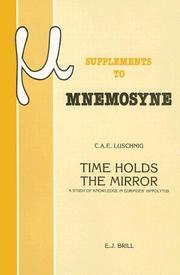
ISBN: 9004086013 9004328939 9789004086012 Year: 1988 Volume: 102 Publisher: Leiden
Abstract | Keywords | Export | Availability | Bookmark
 Loading...
Loading...Choose an application
- Reference Manager
- EndNote
- RefWorks (Direct export to RefWorks)
The work is limited to the question of knowledge in Euripides' Hippolytus and seeks to show that one of the major themes of the Hippolytus , as of the Oedipus , is knowledge. In successive chapters these subjects are treated: (1) the witness theme, seeing and knowing, what the senses reveal; (2) fantasies of other worlds created by the characters and how these fantasies reavel the character's perceptions of the world; (3) how Euripides causes his characters to become aware of the shifting meanings of words and how it happens that one statement and its opposite can be predicated of the same individual or act; (4) the desire for and fear of knowledge and the choice of ignorance; (5) the use of generalization as a kind of ignorance; (6) the relation of the character's knowledge to that of the audience. The work offers a new perception of the drama through a detailed examination of this important question that was so warmly debated among the early Sophists.
Drama --- Euripides --- Greek drama (Tragedy) --- Hippolytus (Greek mythology) in literature --- Knowledge, Theory of, in literature --- Tragédie grecque --- Hippolyte (Mythologie grecque) dans la littérature --- Théorie de la connaissance en littérature --- History and criticism --- Histoire et critique --- Euripides. --- Hippolytus (Greek mythology) in literature. --- Knowledge, Theory of, in literature. --- 875 EURIPIDES --- Griekse literatuur--EURIPIDES --- 875 EURIPIDES Griekse literatuur--EURIPIDES --- Euripide --- Tragédie grecque --- Hippolyte (Mythologie grecque) dans la littérature --- Théorie de la connaissance en littérature --- Kennisleer / in de letterkunde. --- Euripide. Hippolyte. --- Connaissance (Théorie de la) / dans la littérature. --- Euripides. Hyppolytus. --- Literature. --- Belles-lettres --- Western literature (Western countries) --- World literature --- Philology --- Authors --- Authorship --- Hippolytus --- Hipòlit --- Hipolitas --- Hipólito --- Hippolütosz --- Hippolyte --- Hippolytos --- Ippolito --- Ippolitu --- Hippolytus (Euripides) --- Hippolytos (Euripides) --- Euripidou Hippolytos (Euripides) --- Crowned Hippolytus (Euripides) --- Hippolytos stephanēphoros (Euripides)
| Listing 1 - 8 of 8 |
Sort by
|

 Search
Search Feedback
Feedback About UniCat
About UniCat  Help
Help News
News